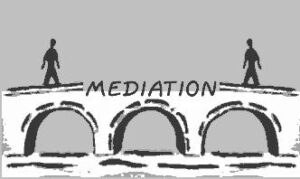Mediation as a tool in Dispute Resolution or What makes a good mediator.
Mediation is a procedure in which the parties discuss their disputes with the assistance of a trained impartial third person(s) who assists them in reaching a settlement. It may be an informal meeting among the parties or a scheduled settlement conference. The dispute may either be pending in a court or potentially a dispute which may be filed in court. Cases suitable for mediation are disputes in commercial transactions, personal injury, construction, workers compensation, labour or community relations, divorce, domestic relations, employment or any other matters which do not involve complex procedural or evidentiary issues. Attendance at the mediation conference is voluntary by the parties, except where governed by statute or contract clause.
I am using Systeme.io, the world’s friendliest business engine…it’s FREE…forever!
The mediator is a person with patience, persistence and common sense. She/he has an arsenal of negotiation techniques, human dynamics skills and powers of effective listening, articulation and restatement. The mediator is a facilitator who has no power to render a resolution to the conflict. The parties will fashion the solution as the mediator moves through the process. In many jurisdictions, the mediator is an attorney but can not give legal advise while in the role of a mediator. However, the mediator’s subject area expertise may be beneficial to the parties in wording and framing the mediated agreement or in circumstances where the parties are open to neutral case evaluation.
Characteristics of a good Mediator
What makes someone a good mediator? Although many positive qualities and skills come into play, the five characteristics below are invaluable when it comes to success.
I am using Systeme.io, the world’s friendliest business engine…it’s FREE…forever!
- Trustworthiness
A good mediator inspires trust. When people attend a mediation session, they want to believe that the mediator will keep all discussions confidential and use any information they receive to reach a mutually acceptable resolution to the situation. If clients don’t get this impression, they won’t talk openly and the purpose of mediation is defeated. On the other hand, if the mediator’s manner reflects sincerity, strength, and fairness, both sides may be more cooperative and receptive to the mediation process. - Approachability
Good mediators are seen as friendly, empathetic, and respectful. They listen carefully, appreciate the emotions and needs that underlie each conversation, and come across as genuinely concerned with the well-being of everyone involved. When they acknowledge feelings, display an appropriate sense of humor, and convey a sense of optimism, both sides to a dispute will, in theory, follow suit. - Dedication
Dedication is a sterling quality in all professionals, and mediators are no exception. When they devote time before each session to properly prepare and work diligently to achieve a positive outcome in every situation, their effectiveness in dispute resolution increases. Clients are quick to perceive when a mediator is applying extra effort to bring about a fair conclusion. - Perceptiveness
Parties to a dispute want mediators who can quickly grasp a situation, understand its complexities and dynamics, and provide a clearer understanding of options by analyzing the issues and identifying risks. This level of perceptiveness enables more creative problem-solving and increases the chances of an outcome that both sides find acceptable. - Impartial
When it comes to successful mediation, impartiality is as important as approachability. To be effective, a mediator must be able to control their feelings and not invest emotionally in the outcome of the proceedings. That way they are better able to create, identify, and take advantage of opportunities that help both sides realize their goals.
I am using Systeme.io, the world’s friendliest business engine…it’s FREE…forever!
The 6 Steps of a formal Mediation
There are 6 steps to a formal mediation;
1) introductory remarks
2) statement of the problem by the parties
3) information gathering time
4) identification of the problems
5) bargaining and generating options
6) reaching an agreement.
Introductory Remarks
The mediator will wait until both parties are present and then make introductions. The physical setting will be controlled so that no party feels threatened. Most mediators will ask that if children are present, they wait outside. The mediator will then give an opening statement. This outlines the role of the participants and demonstrates the mediator’s neutrality. Some mediators will make comments about what they see as the issue and confirm the case data if briefs have been pre-submitted. Next, the mediator will define the protocol and set the time frame for the process. There will be a review of the mediation guidelines and the mediator will briefly recap what it is that he has heard as the issues.
I am using Systeme.io, the world’s friendliest business engine…it’s FREE…forever!
The opening statement during the introductory remarks will set out the ground rules for the mediation. These ground rules are what help the mediation move along smoothly. The mediator will usually ask that if attorneys are present, they can confer, but the clients should speak for themselves. Parties should not interrupt each other; the mediator will give each party the opportunity to fully share their side of the story.
Statement of the Problem by the Parties
After the opening statement, the mediator will give each side the opportunity to tell their story uninterrupted. Most often, the person who requested the mediation session will go first. The statement is not necessarily a recital of the facts, but it is to give the parties an opportunity to frame issues in their own mind and to give the mediator more information on the emotional state of each party. If there are lawyers present who make the initial statement, the mediator will then ask the client to also make a statement. The rationale behind the statement of the problem is not a search for the truth; it is just a way to help solve the problem.
Information gathering
The mediator will ask the parties open-ended questions to get to the emotional undercurrents. The mediator may repeat back key ideas to the parties and will summarize often. This helps the mediator build rapport between the parties, especially when a facilitative style is used.
Problem identification
This might also be part of other segments. The mediator tries to find common goals between the parties. The mediator will figure out which issues are going to be able to settle or those that will settle first.
Bargaining and generating Options and Reaching an Agreement
Methods for developing options may include group processes, discussion groups or sub-groups, developing hypothetical plausible scenarios, or a mediator’s proposal where the mediator puts a proposal on the table and the parties take turns modifying it. However, the most commonly used method is the caucus.
Once the participants are committed to achieving a negotiated settlement, the mediator will propose a brainstorming session to explore potential solutions. This can lead to a final agreement, which diffuses the conflict and provides a new basis for future relations.
 The mediator may decide to hold private sessions with both parties in order to move the negotiations along. This caucus session will be confidential. The caucus provides a safe environment in which to brainstorm and surface underlying fears. The goal of the session is to find some common ground by exploring lots of options, and to bring about possible solutions for the parties to think about. Parties can also entertain alternative solutions to their problems without committing themselves to offer the solutions as concessions.
The mediator may decide to hold private sessions with both parties in order to move the negotiations along. This caucus session will be confidential. The caucus provides a safe environment in which to brainstorm and surface underlying fears. The goal of the session is to find some common ground by exploring lots of options, and to bring about possible solutions for the parties to think about. Parties can also entertain alternative solutions to their problems without committing themselves to offer the solutions as concessions.
Depending on the complexity of the issues, mediation might last mere hours, or it could take days, weeks, or months to resolve. Some resolutions will truly be “win-win”; others will be just barely acceptable to one or both sides—but better than the prospect of a continued fight or court battle. If the parties come to a consensus, the mediator will outline the terms and may write up a draft agreement. If you fail to reach agreement, the mediator will sum up where you have left off and may engage you in a discussion of your non-settlement alternatives. TRADE & LEGAL LTD BUSINESS AND LAW CONSULTANTS
I am using Systeme.io, the world’s friendliest business engine…it’s FREE…forever!
Disclaimer: This page contains affiliate links. If you choose to make a purchase after clicking a link, I may receive a commission at no additional cost to you. Thank you for your support!





